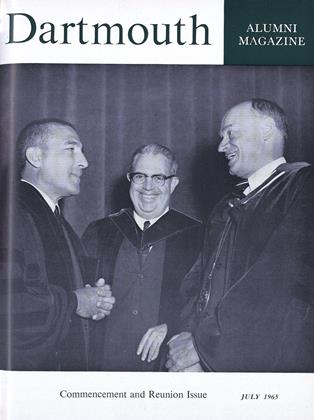ByFrancis I. Frellick '52. Englewood Cliffs,N. J.: Prentice-Halt, Inc., 1965. 144 pp.$2.95.
These few unpretentious pages could replace almost all the "pastoral counselling" hooks on almost all ministers' shelves just as surely as "Dr. Spock has replaced grandmothers." Written for ministers and counsellors of young people, they are more importantly for every parent of young people, indeed for all of us who are to face again the long hot summer's headlines telling the acts of our "delinquent" young people. Read these earnest pages and I assure you that from here on in you will hear every new account of "juvenile delinquency" with sympathy, patience, and self-identification; you will never again shake your head wondering what in the world our young people are coming to.
Mr. Frellich really turns the tables on us so we learn how it is for us to make and to keep young human life human. He asks us not so much not to cut off our troubled young people, but rather not to cut ourselves off from them - no matter how they "disturb" the serenity of our accustomed ordered society. You will believe him that adolescent and delinquent young people have alike the one mute cry, that they not be left out, not dehumanized during their long and agonized wait between childhood and adult life - that wait during which they are driven to acting out their despair by our "middle class" expectation that all the while they wait they must perform under the rubric of social mores governing adult life. Under this rubric the adolescents' own acute problems are ignored just when it is they, not we, who are least able to await the outgrowing of their problems.
Their problems are mutual and their reaction to their problems is in terms of delinquent behavior. "Hell, we aren't people - we're teenagers!" So "a delinquent subculture" is formed with its own delinquent solution "providing criteria of status which these children can meet" but which solutions are not real answers at all but only affirm all the more their outcast condition.
This book is concerned with young people, not about them. It cleans up our words like gang, adolescent, and delinquent; it persuasively, realistically tells who young people are and why they are and who they want to be. The documentation throughout is excellent for parent, teacher, and churchman. Scientifically, sociologically it is a sound work. It is evangelical, too, in that its sole purpose is the reconciliation, the restoration of even the worst of these our children. Mr. Frellich obviously hopes you will be led to relate yourself to even one of these troubled kids, thus to reconcile him to yourself and both of you to the society of which he longs to be a responsible part.
It is an excellent, disturbing-reassuring book. Read it and you will know every "troublesome" kid around - even Holden Caulfield, that catcher in the rye; you will begin to know yourself, too. Moreover, you will catch an unexpected vision of a uniquely committed life, the author's, in true unselfconscious witness of vocational dedication.
Director of UndergraduateReligious Life
 View Full Issue
View Full Issue
More From This Issue
-
 Feature
FeatureThe Quest for Quality
July 1965 By STEWART LEE UDALL, LL.D. '65 -
 Feature
FeatureSidney Chandler Hayward '26
July 1965 -
 Feature
FeatureChange and Challenge
July 1965 By HAROLD KING DAVISON '15 -
 Feature
FeatureTucker Heads Alumni Council
July 1965 -
 Feature
FeatureAlumni Awards
July 1965 -
 Feature
FeatureHONORARY DEGREE CITATIONS
July 1965
GEORGE H. KALBFLEISCH
Books
-
 Books
BooksFurther Mention
FEBRUARY 1972 -
 Books
BooksAlumni Books
NovembeR | decembeR -
 Books
BooksIF YOU'RE A BANK DIRECTOR
December 1950 By G. W. WOODWORTH -
 Books
BooksMyth and Counter-Myth
NOVEMBER 1981 By Robert H. Ross '38 -
 Books
BooksMAN OF GOD
November 1941 By Roy B. Chamberlin -
 Books
BooksMETHOD AND THEORY IN EXPERIMENTAL PSYCHOLOGY.
January 1954 By THEODORE KARWOSKI



